
Unsupported: No evidence was provided for the implicit claim that COVID-19 vaccination is associated with an increased risk of heart attacks. Furthermore, studies on this subject so far haven’t found that vaccinated people are more likely to have heart attacks.

FULL CLAIM: COVID-19 vaccines are responsible for the rise in heart attacks in young people; “They got through the whole report without mentioning lockdowns or vaccines, which it would seem ought to be part of any reasonable debate and exploration into what has caused this 30 percent spike in heart disease”
REVIEW
On 27 February 2023, comedian Russell Brand published a YouTube video about a new study reporting a rise in heart attacks in young people. In the video, Brand took aim at a CBS News interview discussing the study. In the fashion of “just asking questions”, he asked why COVID-19 would be considered as the explanation for the rise in heart attacks, while factors such as vaccines and lockdowns were being overlooked, and suggested that the truth was being hidden. The video has received more than a million views to date.
Brand steered clear of explicitly claiming that COVID-19 vaccines are responsible for the rise in heart attacks—ostensibly because of YouTube’s policy against COVID-19 vaccine misinformation, which he referenced multiple times during the video—but his position as a vaccine skeptic is well-known. And the same video on Rumble carries the title “Shh…Don’t Mention The Vaccines”, in contrast to the more ambiguous title of the video on YouTube (“IT’S STARTING TO COME OUT”), establishing that the video aimed to implicitly suggest the heart attacks were due to COVID-19 vaccination.
If one attempts to share the YouTube video on Facebook, the same title as the Rumble video appears (see screenshot below).
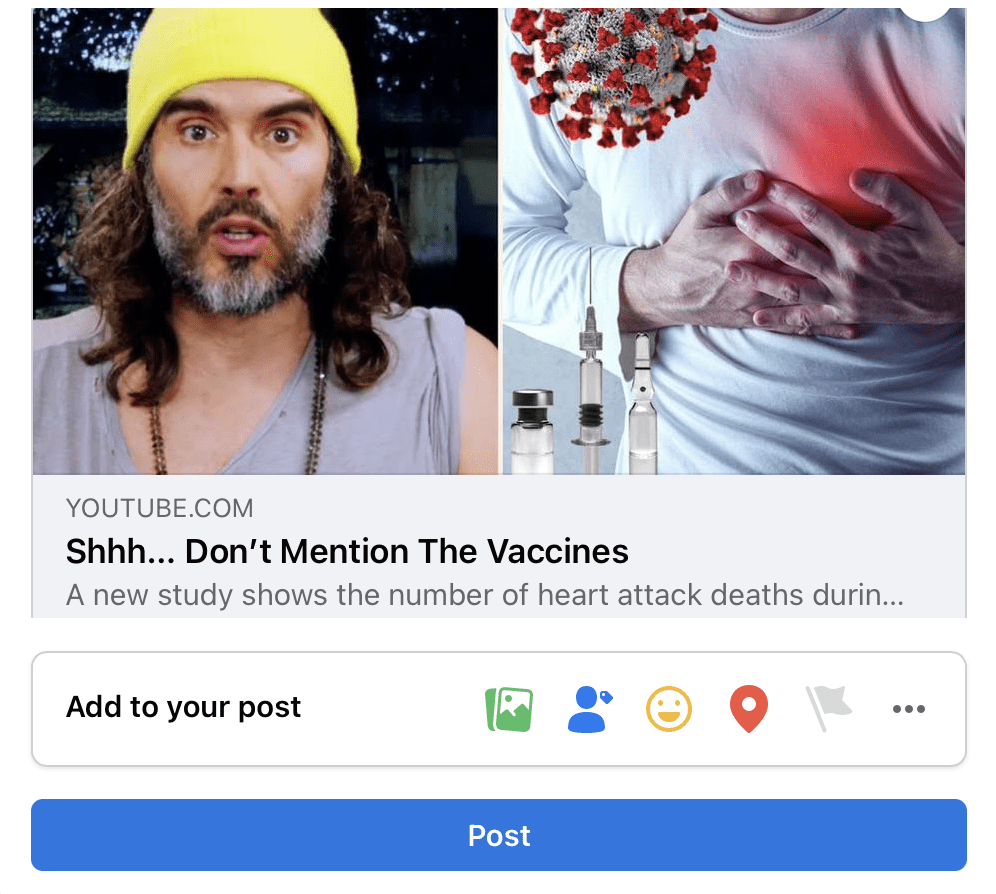
Screenshot of the link preview given on Facebook when one attempts to share Russell Brand’s YouTube video.
But his implication that COVID-19 vaccines cause the increase in heart attacks isn’t supported by the scientific evidence and is contradicted by the data reported in the cited study, as we will show below.
The study showed a rise in heart attack deaths that predated the COVID-19 vaccines
The study by Yeo et al., performed by researchers at Cedars-Sinai Hospital, aimed to study how heart attack deaths in people of various ages changed during the pandemic and the potential causes for the change[1]. They used information from death certificates to identify heart attack deaths, which also enabled them to identify cases directly associated with COVID-19, in which COVID-19 was also listed as a cause of death.
The authors compared the pre-pandemic period with four different phases of the pandemic: April 2020 to September 2020, representing the first COVID-19 surge; October 2020 to March 2021, representing the second COVID-19 surge; April 2021 to September 2021, representing the third surge; and October 2021 to March 2022, representing the Omicron surge. A graph of weekly COVID-19 cases below shows each of these waves (Figure 1).
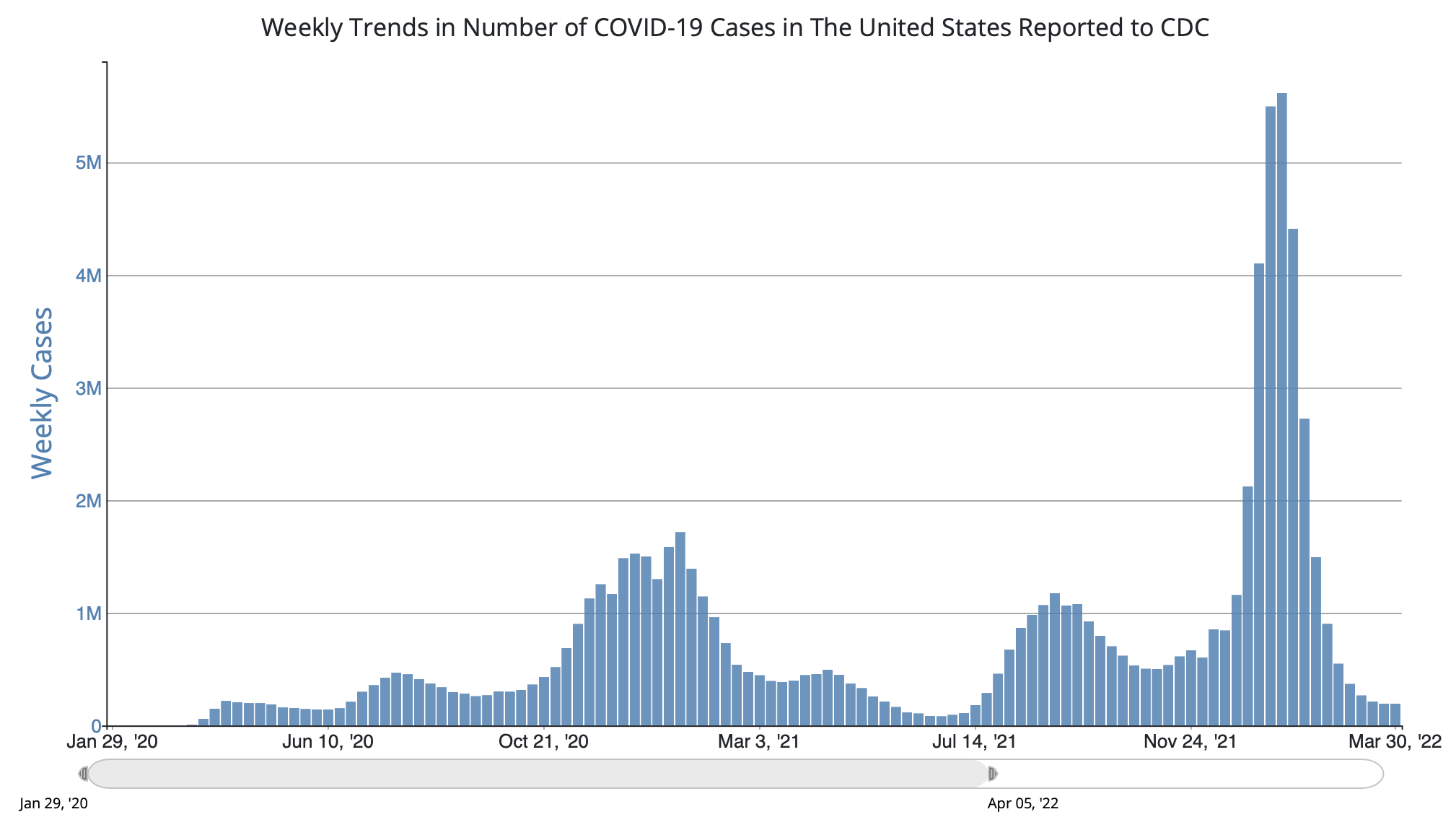
Figure 1. Weekly number of new COVID-19 cases in the U.S. from January 2020 to March 2022. Source: CDC Data Tracker. Data retrieved on 29 March 2023.
Their most notable finding was a rise in excess heart attack deaths in young adults (defined as those between 25 to 44 years old), and in both men and women (Figure 2). This is unusual since people in this age group aren’t expected to have heart attacks in the first place, said Susan Cheng, one of the study’s senior authors.
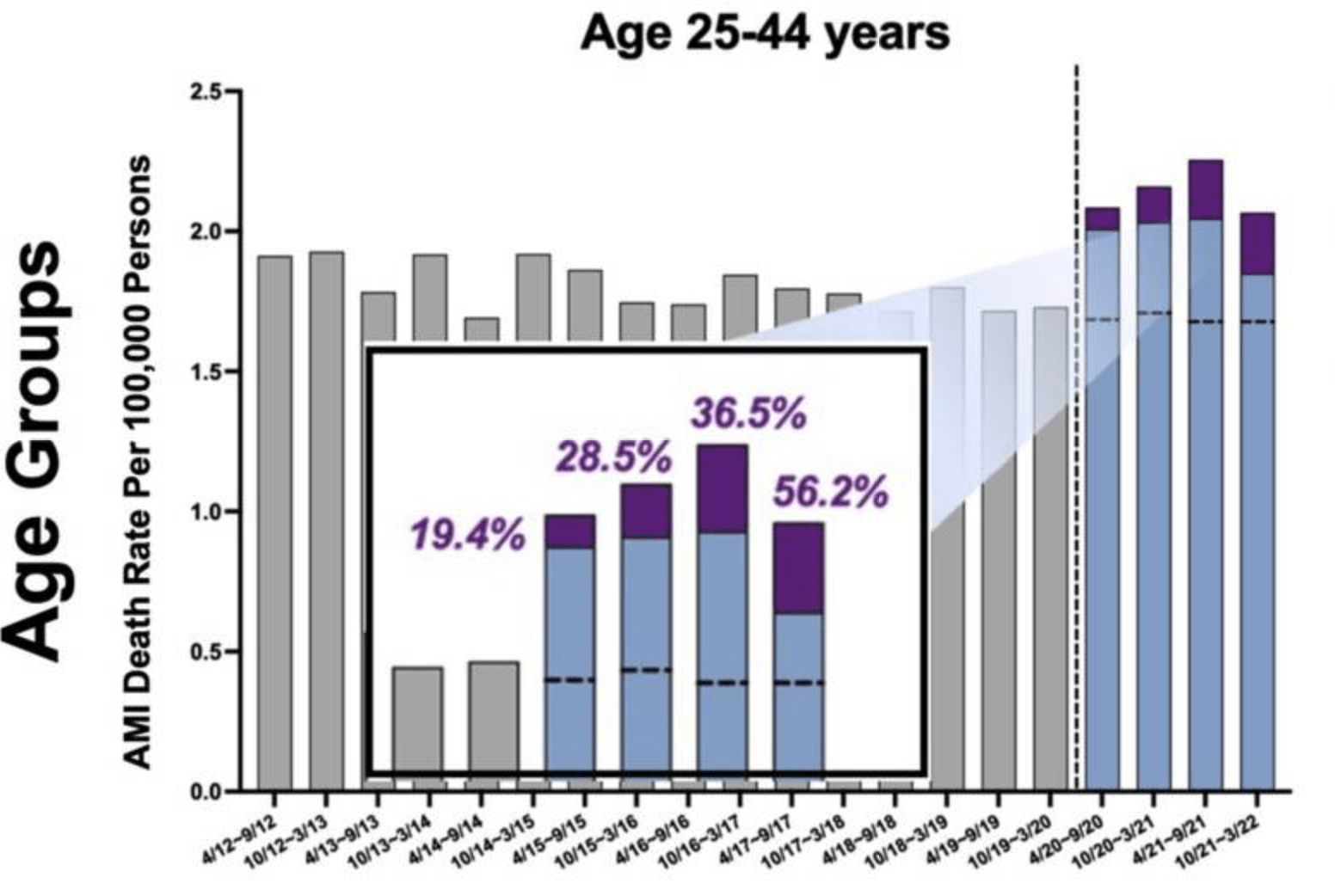
Figure 2. The heart attack mortality rate in people aged 25 to 44 years. The gray bars denote the rate in the pre-pandemic period (years 2012 to 2019). The blue bars represent non-COVID deaths, while the purple bars represent COVID-related deaths, in which COVID-19 was also listed on the death certificate. The dotted line represents the expected mortality rate for that period of the year. Adapted from Yeo et al.[1]
However, the association of this increase with COVID-19 vaccines is incorrect. As we can see from the study, the rise in heart attacks in all age groups already occurred between April and September 2020 and was sustained into the period from October 2020 to March 2021 (Figure 2). Therefore, the increase occurred months before COVID-19 vaccines existed, hence COVID-19 vaccination cannot be the reason for this increase.
Moreover, most of the population aged 25 to 44 was unvaccinated well into the second phase of the pandemic defined in the study (October 2020 to March 2021), since only the elderly and vulnerable groups received the vaccines first. This is yet another observation contradicting the claim.
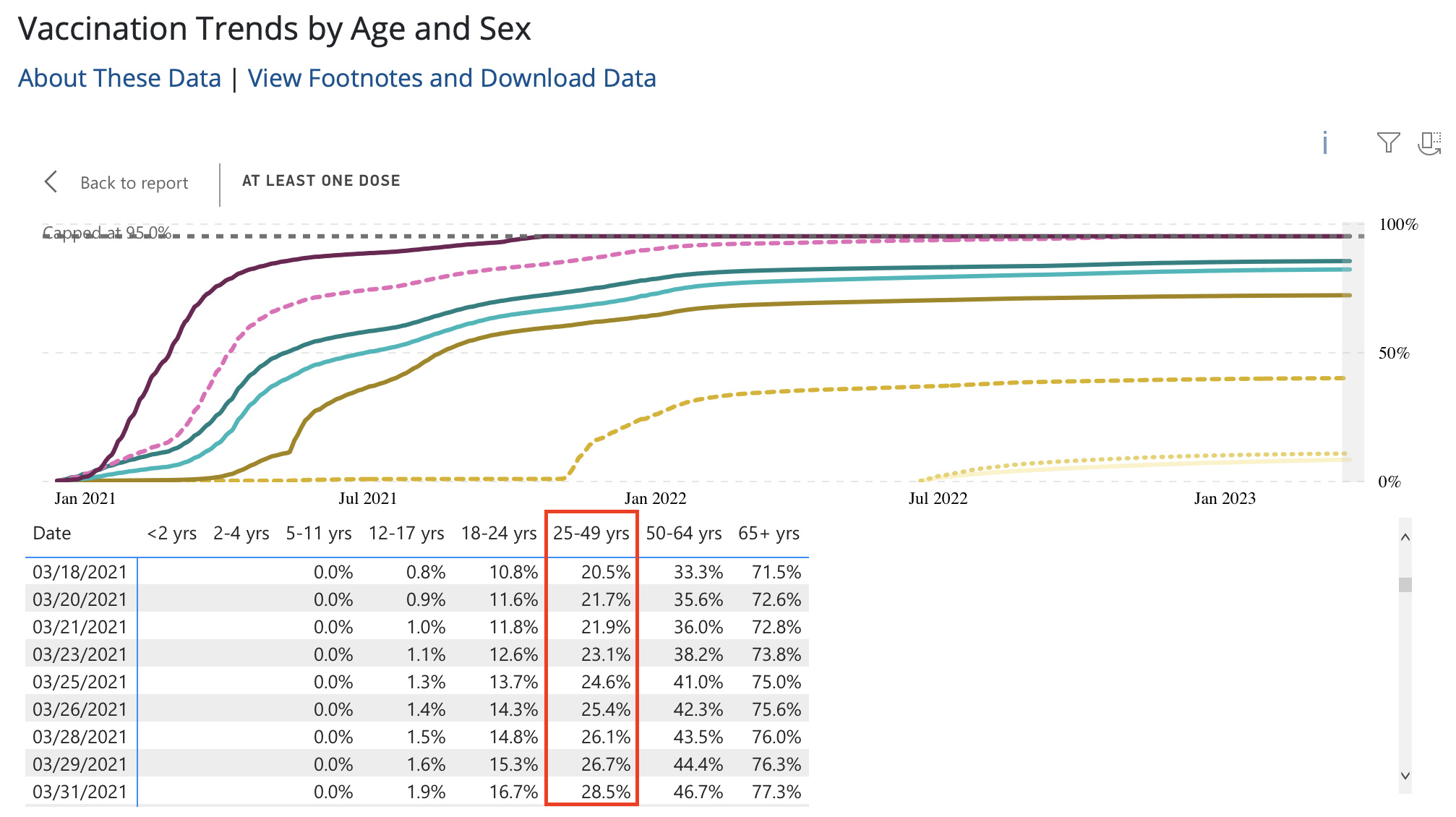
Figure 3. The proportion of people in each age group who received at least one dose of COVID-19 vaccine in the latter half of March 2021. The red box highlights vaccine coverage in people aged 25 to 49 years old. Source: CDC Data Tracker. Data retrieved on 28 March 2023.
Brand also alluded to the increased risk of myocarditis after COVID-19 vaccination as the cause for the increase in heart attacks. While it’s true that COVID-19 mRNA vaccines are associated with a slightly increased risk of myocarditis, this risk isn’t equal across all demographics. On the contrary, it is most prominent in young males, whereas the study showed that the excess heart attack mortality occurred across all age groups and sexes. Consequently, the pattern of heart attack deaths is inconsistent with the pattern of post-vaccine myocarditis.
In summary, the study referenced by Brand actually provided multiple pieces of evidence that contradict the claim that COVID-19 vaccines increase the risk of heart attack.
Health Feedback reached out to the study authors for comment and will update this review if new information becomes available.
Lockdowns, healthcare disruptions potentially contributed to heart attack deaths; COVID-19 more likely to cause heart problems than COVID-19 vaccines
What about Brand’s implication that no one is willing to examine how other variables like vaccines and lockdowns could have changed the risk of heart attack in order to hide vaccine harms? That’s also false, as we will show below.
In the study, Yeo et al. did conclude that COVID-19 was the most likely contributor to this increase, but they also postulated that other issues, such as a delay in care due to lockdowns and healthcare disruption[2-3], could also have contributed to the rise, writing: “there is now abundant evidence of how patients with pre-existing or newly developed cardiovascular conditions have experienced gaps and delays in access to care, especially during periods of COVID-19 surge”.
And there are studies that examined whether COVID-19 vaccination is associated with heart attacks specifically. This study in the U.S., which included 6.2 million people who’d received the COVID-19 mRNA vaccines, found no association between vaccination and heart attacks[4]. Other studies reported a lower risk of heart attacks in vaccinated people compared to unvaccinated people[5-6].
Although certain COVID-19 vaccines come with an increased risk of heart inflammation, this risk is still smaller than the risk of myocarditis and other heart problems associated with COVID-19 itself[7]. Furthermore, a study in U.S. veterans suggested that the elevated cardiovascular risk persists for at least a year after the initial infection[8].
The American Heart Association considers the benefits of the COVID-19 vaccines to outweigh their risks. An expert consensus by the American College of Cardiology also found that “a very favorable benefit-to-risk ratio exists with the COVID-19 vaccine for all age and sex groups evaluated thus far”[9].
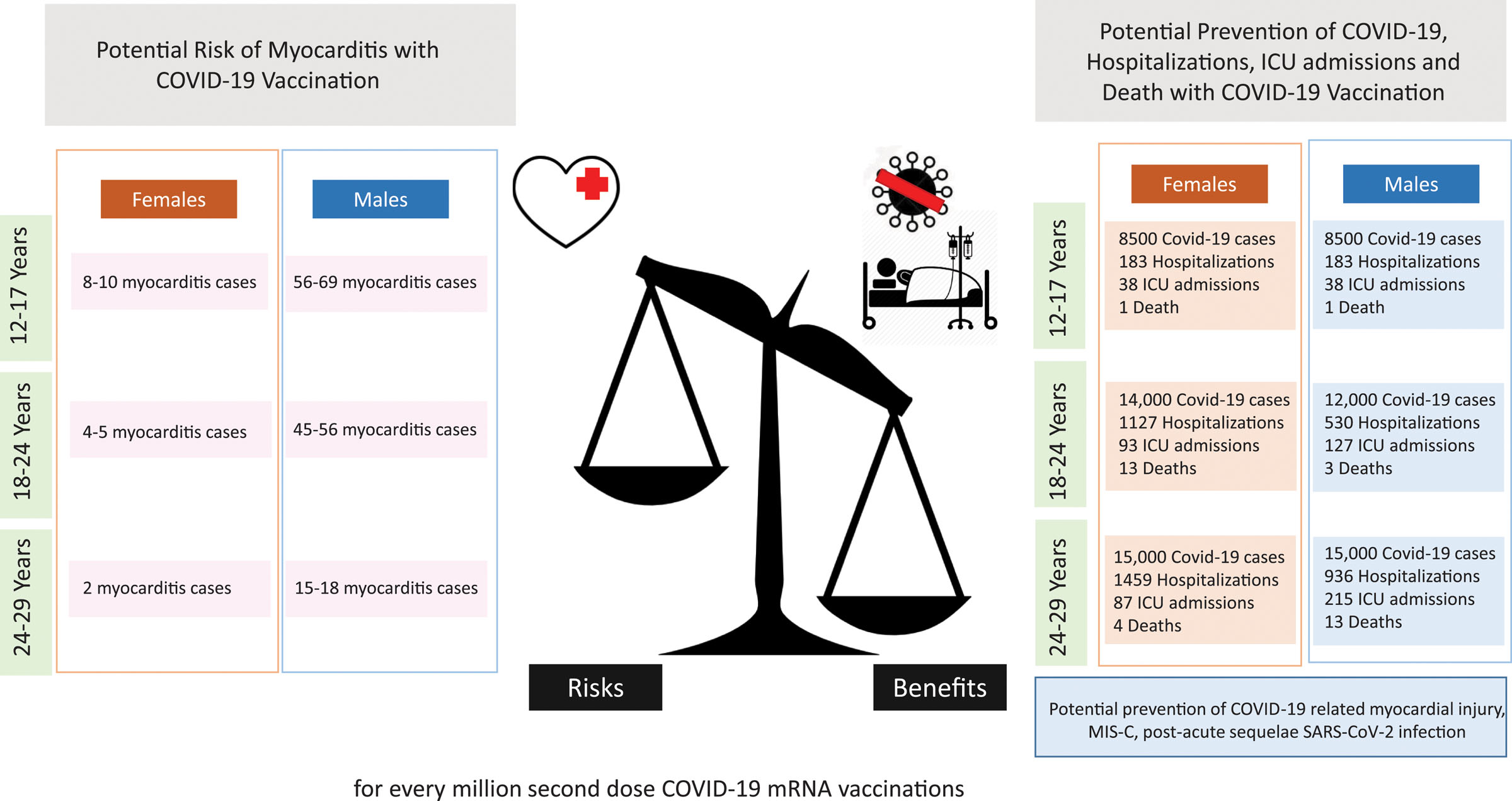
Figure 4. There is a favorable benefit-to-risk ratio for COVID-19 mRNA vaccine recipients at highest risk for postvaccination myocarditis[10].
Conclusion
Multiple scientific studies have documented the detrimental effects of SARS-CoV-2 infection on the heart, making COVID-19 a significant and plausible cause for the increase in heart attack deaths. But scientists consider that other factors, such as a delay in care due to lockdowns and healthcare disruption, could also have contributed to the increase.
However, Brand’s implicit claim that COVID-19 vaccines are the cause of this rise in heart attacks lacks scientific evidence to support it. Studies show that the benefits of COVID-19 vaccines outweigh their risks, and that vaccinated people aren’t more likely to have a heart attack compared to unvaccinated people. The video ignores the growing body of scientific studies on COVID-19 vaccine safety and on how the pandemic affected healthcare outcomes, presenting cherry-picked information in the service of a conspiratorial narrative.
REFERENCES
- 1 – Yeo et al. (2023) Excess risk for acute myocardial infarction mortality during the COVID-19 pandemic. Journal of Medical Virology.
- 2 – Solomon et al. (2020) The Covid-19 Pandemic and the Incidence of Acute Myocardial Infarction. New England Journal of Medicine.
- 3 – Arora et al. (2021) Effect of government-issued state of emergency and reopening orders on cardiovascular hospitalizations during the COVID-19 pandemic. American Journal of Preventive Cardiology.
- 4 – Klein et al. (2021) Surveillance for Adverse Events After COVID-19 mRNA Vaccination. JAMA Network.
- 5 – Whiteley et al. (2022) Association of COVID-19 vaccines ChAdOx1 and BNT162b2 with major venous, arterial, or thrombocytopenic events: A population-based cohort study of 46 million adults in England. PLoS Medicine.
- 6 – Kim et al. (2022) Association Between Vaccination and Acute Myocardial Infarction and Ischemic Stroke After COVID-19 Infection. JAMA Network.
- 7 – Barda et al. (2021) Safety of the BNT162b2 mRNA Covid-19 Vaccine in a Nationwide Setting. New England Journal of Medicine.
- 8 – Xie et al. (2022) Long-term cardiovascular outcomes of COVID-19. Nature Medicine.
- 9 – Writing Committee. (2022) 2022 ACC Expert Consensus Decision Pathway on Cardiovascular Sequelae of COVID-19 in Adults: Myocarditis and Other Myocardial Involvement, Post-Acute Sequelae of SARS-CoV-2 Infection, and Return to Play: A Report of the American College of Cardiology Solution Set Oversight Committee. Journal of the American College of Cardiology.
- 10 – Bozkurt et al. (2021) Myocarditis With COVID-19 mRNA Vaccines. Circulation.


